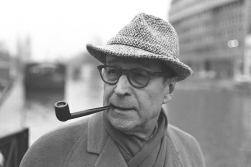Questions, and a Big One
I’ve been facilitating a discussion course at the local Senior College  this summer, using one of the Best American Essays anthologies as a text. One of the more interesting essays, by the novelist Sigrid Nunez, considers the questions readers ask writers and the ones writers ask themselves.
this summer, using one of the Best American Essays anthologies as a text. One of the more interesting essays, by the novelist Sigrid Nunez, considers the questions readers ask writers and the ones writers ask themselves.
The readers’ questions will be familiar to anyone who’s ever attended a reading or other writer’s event:
Why do you write?Where do your ideas come from”How do you create characters?Is your travel for research really tax deductible?Nunez goes on to repeat the complaints writers make about how difficult the work is.
Red Smith—“There is nothing to writing. All you do is sit down and open a vein.”Georges Simenon—“Writing is not a profession, but a vocation of unhappiness.”
I’m happy to think writing is mostly a pleasure and a way of breathing, but I won’t contradict my betters.
Nothing else in the essay tickled my interest, until she got to this question: Why do writers do this? Why do they write?
One of the standard answers is that writing is an obsession, a vocation, something a writer cannot not do. Or it is a personal attempt to understand what we know or think. Some writers write strictly to entertain.
But beyond the why, how do we justify spending our time inventing stories and people when we might use that time for something more directly useful to the world? (Not to mention something that pays better.)
In the political, cultural, and historical maelstrom we live in, do we need to do something more than entertain others and ourselves? The immediate political fracas, the climate crisis, the long-term effects of living in a world where factions struggle for power for its  own sake are enough to send anyone screaming into the woods.
own sake are enough to send anyone screaming into the woods.
Are we, as fiction writers at least, hiding in the forest? Who doesn’t want to help, contribute somehow?
Nunez quotes Orhan Pamuk’s statement that that all novels are political, because writers show passion and sympathy for their characters’ situations. With our compassion, we see through others’ eyes and identifying with “the other” is a political stance. It’s a hopeful idea, but one I find unhelpful.
Is our function only giving our readers entertainment, then? That’s thin soup for someone who wants a writing life with meaning.
The comfort I took from Nunez’s piece was an offhand comment she makes toward the end. In essence, she says that everyone has the work they must do. For writers, writing is that work. We write because we must, not only because we want to. But I still think we want more.
In 2004, I was a Fellow at a writer’s gathering in Enterprise, Oregon, hard by the Idaho border. I’d won the fellowship on the basis of a story I published about an old dying woman in a wheelchair who decides not to kill herself because she is so curious about what comes next. One of the authors at the gathering, a man I admired, told me my story helped him understand the fierceness of his mother as she edged toward he own death. That, my friends, was more than enough reason for me to have written it.
Maybe how we judge the worth of what we do is whether we live up to the words of Czeslaw Milosz, who asks only that a piece of writing be “of use to at least one person in his struggle with himself and the world.” We have our work, we do our work, and we hope for the best.
Lea Wait's Blog
- Lea Wait's profile
- 509 followers



